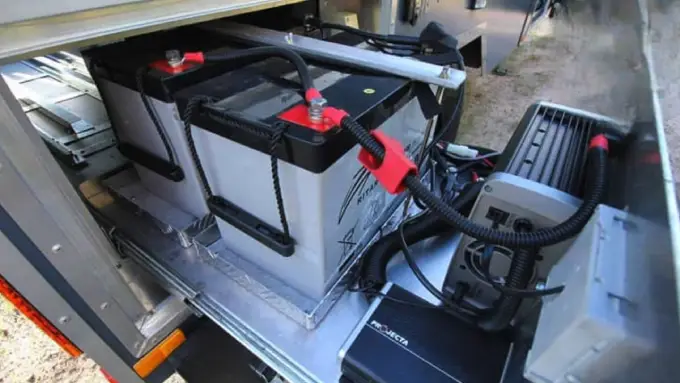Last Updated on April 19, 2023
RV travel is an exciting and adventurous experience, but it can quickly become a nightmare if your RV battery dies.
A dead RV battery affects your ability to move your RV and impairs your ability to access modern amenities, such as lights, charging ports, and more.
Depending on the cause of a dead RV battery, including overuse, age, or inadequate maintenance, there are several ways to revive it.
Here, You will learn how to revive your dead RV battery and ensure it remains in good condition for a long time. So let’s dive in.
How Can Dead RV Batteries Be Revived?
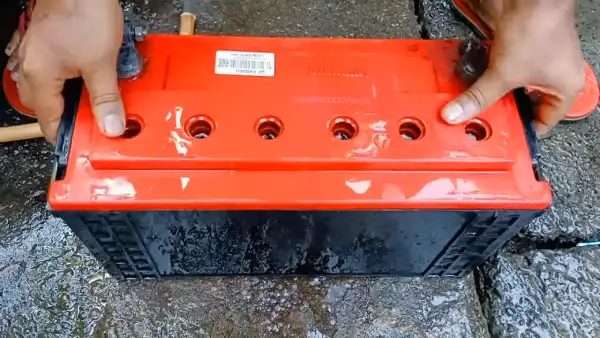
A charger can revive dead RV batteries. Reviving a dead battery involves using an external power source to recharge the battery’s cells. However, it is important to note that not all dead batteries can be revived. It must be replaced if the battery can’t be repaired or worn out.
Trickle Charger vs. Smart Charger
Using a charger is the best way to revive a dead RV battery. But what type of charger should you use? There are two main types of chargers: trickle chargers and smart chargers.
A trickle charger is a basic charger that delivers a low current charge to your battery over an extended period. This slow charging process can take up to 24 hours or more, but it’s gentle on your battery and won’t cause any damage.
Trickle chargers are ideal for maintaining the charge on your battery while it is in storage or is not being used.
On the other hand, a smart charger is a more advanced type of charger that uses microprocessors to monitor and regulate the charging process.
Smart chargers can detect the state of charge and adjust the charging rate accordingly, which means they can deliver a faster charge than trickle chargers without damaging your battery. They also have safety features like automatic shut-off to prevent overcharging.
When choosing between these two types of chargers, consider your specific needs. A trickle charger may be sufficient if you’re looking for a way to keep your battery charged during storage or when it’s not in use for long periods.
However, if you need to revive a dead RV battery quickly or want to ensure optimal performance and longevity from your battery, investing in a smart charger is worth considering.
Steps to Charge a Dead RV Battery
To charge a dead RV battery, you will need a charger that is compatible with your battery. The process of charging a dead RV battery involves connecting the charger to the battery’s terminals and allowing it to charge for a certain amount of time.
Two types of chargers are available for charging dead RV batteries: trickle chargers and smart chargers. A trickle charger provides a slow and steady charge to the battery over an extended period, while a smart charger adjusts its charging rate based on the needs of the battery.
To use a trickle charger, connect the red clamp to the battery’s positive terminal and the black clamp to the negative terminal. Then, plug in the charger and allow it to charge for several hours or overnight. It is important to monitor the charging progress and disconnect the charger once it is fully charged.
A smart charger is similar to a trickle charger but requires less monitoring as it adjusts its charging rate automatically. Connect the red clamp to the battery’s positive terminal minus the black clamp, then plug in your smart charger. Follow any additional instructions provided by your specific model.
It is important to note that if your RV battery is damaged or worn out beyond repair, no amount of charging will bring it back to life. Signs of irreparable damage include bulging or leaking batteries, corroded terminals, or cracks in the casing.
If Damaged or Worn Out
Unfortunately, once an RV battery is worn out or damaged, it cannot be revived. It’s important to know the signs of irreparable damage so that you can replace your battery promptly.
Signs of Irreparable Damage
Unfortunately, there are times when a dead RV battery cannot be revived. This is usually due to irreparable damage that has occurred over time. Here are some signs that your battery may be damaged beyond repair:
- Bulging or Swollen Battery Case: If you notice that the case of your battery is bulging or swollen, this could indicate that the internal components have been damaged and the battery is no longer safe to use.
- Leaking Battery Acid: A leaking battery can cause serious damage to your RV and should be replaced immediately. If you notice any signs of leaking acid, such as corrosion around the terminals or a foul smell, it’s time for a new battery.
- Low Voltage Output: If your battery is not holding a charge and its voltage output is consistently low, this could mean that the cells inside the battery have become damaged and it will need to be replaced.
- Age: Like all batteries, RV batteries have a limited lifespan. If your battery is more than five years old and showing signs of wear and tear, it may be time for a replacement.
Reasons for Dead RV Batteries
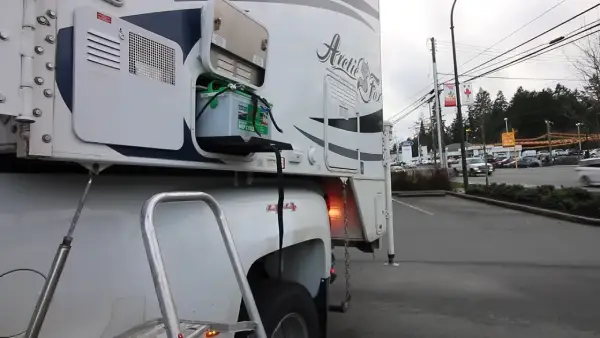
Dead RV batteries can be a frustrating and costly problem for any RV owner. There are several reasons why an RV battery may die.
Overuse
Overuse is one of the main reasons for dead RV batteries. When you overuse your battery, it drains its power and reduces its lifespan. This can happen if you use too many appliances or electronics in your RV without giving the battery enough time to recharge.
For example, running your air conditioner, refrigerator, and TV all at once for an extended period will drain the battery faster than it can recharge. Overuse can also happen if you frequently take short trips without allowing enough time for the battery to charge fully.
Age of the Battery
The age of your RV battery is a crucial factor in determining its lifespan. As batteries age, they lose their ability to hold a charge, making them more prone to failure. Generally, most RV batteries have a lifespan of 3 to 5 years, depending on how they are used and maintained.
It’s essential to keep track of the age of your battery and replace it when necessary. Using an old battery can result in poor performance and even damage your RV’s electrical system.
Inadequate Maintenance
Inadequate maintenance is one of the primary reasons for dead RV batteries. Neglecting your battery can lead to a decrease in its lifespan and performance. Proper maintenance is crucial to keep your battery in good condition and prevent it from dying prematurely.
One of RV owners’ most common mistakes is not regularly checking their battery’s water levels. Lead-acid batteries require distilled water to function correctly, and if the water levels are low, it can damage the battery’s cells and cause it to die.
Therefore, you should check your battery’s water levels once a month, especially during hot weather conditions when evaporation rates increase.
Another aspect of inadequate maintenance is failing to keep your battery clean. Dirt, dust, and debris can accumulate on the surface of the battery and affect its performance. You should clean your battery regularly using a mixture of baking soda and water to remove any buildup on the terminals.
Signs of a Dead RV Battery
As an RV owner, it’s important to keep an eye on the health of your battery. A dead RV battery can be a frustrating and inconvenient problem, especially if you’re out on a camping trip. Knowing the signs of a dead battery can help you address the issue before it becomes a major headache.
Dimming Lights and Appliances
Dimming lights and appliances are the most common signs of a dead RV battery. When your battery is not providing enough power, you may notice that the lights in your RV start to dim or flicker. Appliances like your refrigerator or air conditioner may also start to work less efficiently.
This happens because the battery cannot provide enough energy to meet the demands of your RV’s electrical components. As a result, they start drawing more power from the battery than it can supply, causing a drop in voltage and resulting in dimming lights and appliances.
It’s important to note that other factors, such as loose connections or a faulty alternator, can also cause dimming lights and appliances. However, your RV battery likely needs attention if you have ruled out these possibilities and still experience dimming lights and appliances.
Clicking Sound When Turning the Key in Ignition
A clicking sound when turning the key in the ignition is one of the signs that your RV battery might be dead or dying. This sound typically indicates that there isn’t enough power to turn over the engine.
Turning the key in the ignition sends a signal to your battery to send power to your starter motor. If your battery is dead or low on charge, it won’t be able to provide enough power to start the engine, and you’ll hear a clicking sound instead.
Battery Dashboard Indicator Light
The Battery Dashboard Indicator Light is an important feature in your RV that can alert you to potential battery problems. This light is usually located on the dashboard of your RV and is designed to warn you when there are issues with your battery.
The indicator light can come on for a variety of reasons, such as low voltage or a failing battery. If you notice the light is on, it’s important to take action immediately to prevent further damage to your battery.
A low battery charge is one common reason for the indicator light coming on. This can happen if you’ve been using your RV’s appliances or lights for an extended period without recharging the battery. In this case, you may be able to recharge the battery using a charger and get back on the road.
When to Replace Your RV Battery
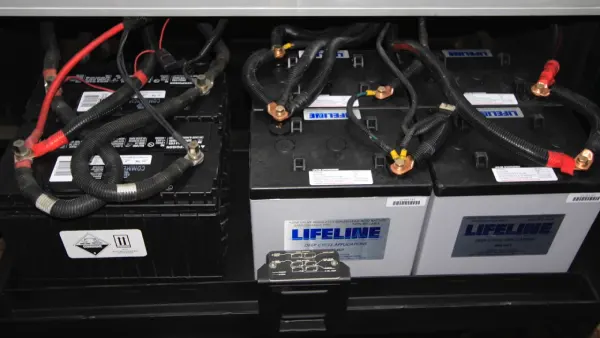
Knowing when to replace your RV battery is crucial in ensuring that you have a reliable power source while on the road. RV batteries typically last between 3-5 years, but this can vary depending on usage and maintenance.
One of the most obvious signs that it’s time to replace your RV battery is if it no longer holds a charge or cannot be recharged. However, there are other signs to look out for:
- Slow cranking or difficulty starting the engine
- Corrosion around the battery terminals
- Swollen or bulging battery case
- Leaking battery acid
If you notice any of these signs, replacing your RV battery as soon as possible is important. Using a damaged or worn-out battery can strain your vehicle’s electrical system unnecessarily and potentially cause further damage.
When shopping for a replacement RV battery, be sure to consider factors such as size, capacity, and type (e.g. lead-acid vs. lithium-ion). It’s also important to purchase from a reputable brand and retailer to ensure quality and reliability.
Preventing Dead RV Batteries
The best way to revive a dead RV battery is to prevent it from dying in the first place. To do this, you’ll want to ensure your battery is properly maintained and charged. Here are some tips:
Regularly Check and Maintain Your Battery
Regularly checking and maintaining your RV battery is essential to prevent it from dying prematurely. Neglecting your battery can lead to a shorter lifespan, which can be frustrating and costly in the long run. To avoid this, here are some tips on how you can maintain your RV battery:
- Keep it clean: Dirt and debris can accumulate on your battery over time, which can cause corrosion and reduce its performance. To prevent this, make sure to clean your battery regularly using a solution of baking soda and water.
- Check the water levels: Most RV batteries are lead-acid batteries that require water to function properly. It’s crucial to check the water levels in your battery every month or so, especially during hot weather conditions when the water evaporates quickly.
- Test the voltage: Testing the voltage of your RV battery is an excellent way to determine if it’s still in good condition or not. You can use a multimeter to check the voltage of your battery, and if it’s below 12 volts, then it’s time for a recharge.
- Charge your battery regularly: Regular charging is one of the best ways to maintain your RV battery’s health. If you’re not using your RV for an extended period, charge the battery once every month.
- Store it properly during winter months: Cold temperatures can affect your RV battery’s performance, leading to a shorter lifespan. To prevent this, store your battery in a dry place between 32°F and 80°F during winter months.
Invest in a Quality Battery
Investing in a quality battery is crucial to prevent dead RV batteries. A good quality battery will last longer and perform better, saving you money and hassle in the long run.
When choosing a battery for your RV, consider factors such as its size, capacity, and type. The most common types of batteries used in RVs are lead-acid batteries, AGM (absorbent glass mat) batteries, and lithium-ion batteries.
Each type has its own advantages and disadvantages, so it’s important to do your research before making a decision.
Lead-acid batteries are the most affordable option but require regular maintenance to ensure their longevity. AGM batteries are more expensive but have a longer lifespan and require less maintenance. Lithium-ion batteries are the most expensive but offer the longest lifespan, fastest charging time, and highest energy density.
Additionally, make sure to choose a battery that is appropriate for your RV’s power needs. Consider how many appliances you’ll be using at once and how often you’ll be camping off-grid. Choosing a battery with insufficient capacity can lead to premature failure or even damage to your RV’s electrical system.
Finally, invest in a reputable brand with good customer reviews. A quality battery from a reliable manufacturer will give you peace of mind knowing that it will perform well and last for years to come.
Proper Storage During Winter Months
Proper storage of your RV battery during winter is crucial to ensure its longevity and prevent it from dying prematurely. When storing your RV for an extended period, you must take a few steps to protect the battery from damage caused by cold temperatures.
Firstly, disconnect the battery from any electrical connections in your RV. This will prevent any parasitic loads from draining the battery while it’s in storage. Parasitic loads are small electrical devices that continue to draw power from the battery even when your RV is turned off.
Next, clean the battery terminals with a wire brush and apply a thin layer of petroleum jelly or dielectric grease to prevent corrosion. Corrosion can cause poor connectivity between the terminals and the cables, leading to reduced performance and a shorter lifespan for your battery.
After cleaning and disconnecting, store your RV battery in a cool, dry place without exposure to extreme temperatures or direct sunlight. If you have access to electricity, consider using a battery maintainer or trickle charger to keep the battery charged throughout its storage period.
A battery maintainer is designed to keep batteries fully charged without overcharging them. It monitors the charge level of your RV’s battery and automatically adjusts its output voltage accordingly. This ensures that your battery remains fully charged without being damaged by excessive voltage levels.
On the other hand, a trickle charger provides a constant low-level charge to keep the battery topped up but may not be as precise as a smart charger. Trickle chargers are best used for short-term maintenance rather than long-term storage.
How long can dead batteries last?
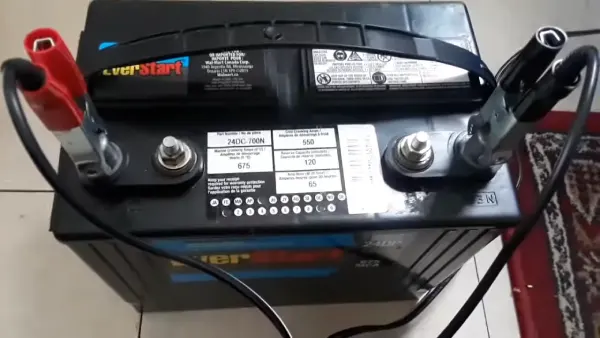
Dead batteries can last anywhere from 2 weeks to 6 months, depending on various factors such as usage, condition, and storage. For instance, fully charged car batteries can last 2-3 weeks without use, while removed car batteries can last between 6 weeks and 6 months.
It is worth mentioning that climate, car model, and maintenance can also significantly impact a battery’s lifespan.
How can I know if a battery is completely dead?
Several signs can indicate that a battery is dead or about to fail. These include an odd smell, blue-green powder on terminals, illuminated warning lights, the engine won’t crank or cranks slowly, and the engine starts but immediately shuts off.
If you suspect your battery is dead or failing, you can test it using a multimeter either at home or in an auto service shop. It is generally advisable to replace the battery before it fails completely to avoid getting stranded.
Bring the Power of Life Back to Your RV Battery
Dealing with a dead RV battery can be a headache for any RV owner. However, many factors can contribute to the battery’s failure, and the good news is that there are various ways to revive dead RV batteries.
Solutions include using trickle chargers or smart chargers, proper battery maintenance, and investing in high-quality batteries. By paying attention to your battery’s needs, you can extend the lifespan of your battery and avoid encountering similar problems in the future.
Don’t hesitate to contact professionals if you’re unsure how to navigate dead battery issues. With the right knowledge and equipment, you’ll be able to revive and restore the power to your RV battery in no time.

